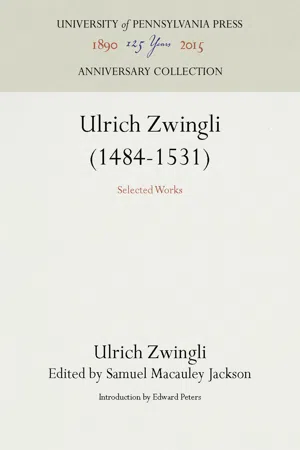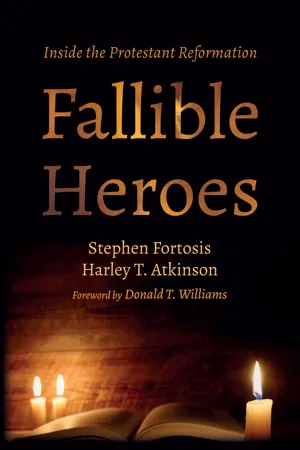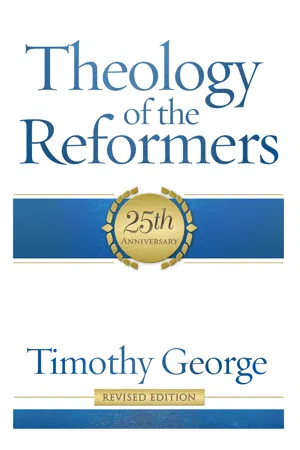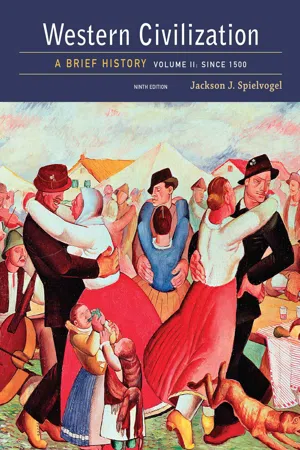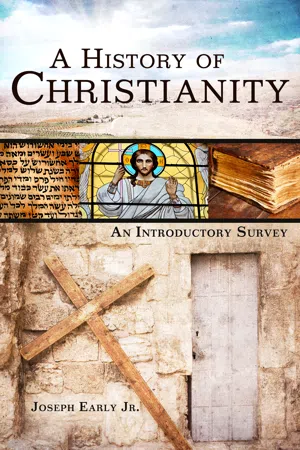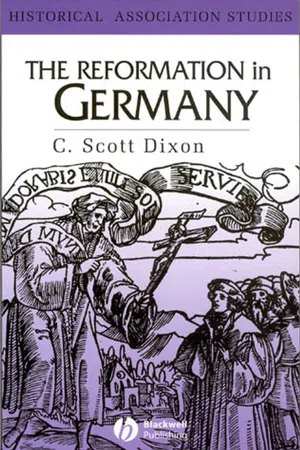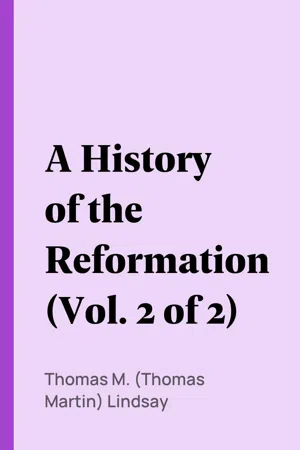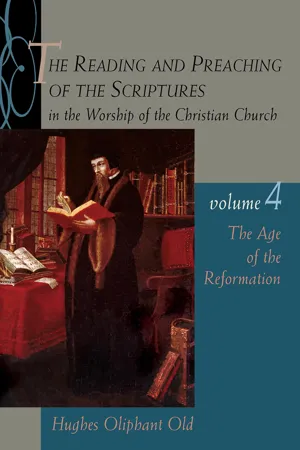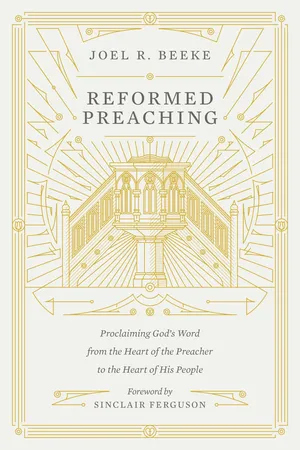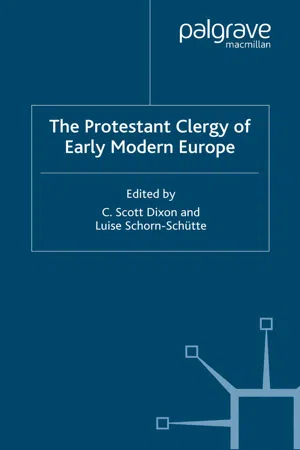History
Ulrich Zwingli
Ulrich Zwingli was a Swiss theologian and leader of the Reformation in Switzerland during the 16th century. He is known for his role in the establishment of the Reformed tradition of Protestantism. Zwingli's teachings emphasized the authority of scripture and the rejection of many traditional Catholic practices, contributing to the spread of Protestant ideas in Europe.
Written by Perlego with AI-assistance
Related key terms
1 of 5
11 Key excerpts on "Ulrich Zwingli"
- eBook - PDF
Ulrich Zwingli (1484-1531)
Selected Works
- Ulrich Zwingli, Samuel Macauley Jackson(Authors)
- 2016(Publication Date)
INTRODUCTION. Ulrich Zwing li and the Reformation in Switzerland ι Δ FEW individuals with distinctive, complex minds and troubled consciences dominate the early history of the Reformation. * T h e learning and wit of Erasmus, the personal religious anguish of Luther, the intense, practical efficiency and cosmopolitanism of Zwingli and Calvin, and the social fury of T h o m a s Müntzer often seem to dwarf not only the hundreds of lesser figures who in fact accomplished the ecclesiastical and social reforms of the sixteenth century, but to detach these men themselves from any recognizable social background and intellectual tradition. Ulrich Zwingli's career is the history of the personal intellectual and religious growth of one such individual, yet it is also deeply rooted in the urban life of the city of Zürich and the more complex political history of the R e f o r m a -tion in Switzerland. Like Erasmus and Luther, Zwingli influenced the thought of reformers and Catholics alike, and the dissident strains of the Zürich reform movement influenced many communi-ties and touched the reformation of England and Scotland. Y e t *I would like to thank Professor Werner L. Gundersheimer for his kind-ness in reading an early draft of this essay and making several helpful suggestions. Any errors and infelicities that remain, however, are entirely my own. ν VI INTRODUCTION. the n o v e l t y of Z w i n g l i ' s ideas a n d the w i d e a p p e a l some o f t h e m held for other reformers s o m e t i m e s d i s t r a c t a t t e n t i o n from his intense regional o u t l o o k , his influence on the c i t y o f Z ü r i c h , his uniquely Swiss career a n d p e r s o n a l i t y . W i t h E r a s m u s and L u t h e r , Zwingli represents b o t h traditional and n o v e l strains o f religious t h o u g h t and p r o g r a m s for ecclesiastical a n d social reform. - eBook - ePub
Fallible Heroes
Inside the Protestant Reformation
- Stephen Fortosis, Harley T. Atkinson(Authors)
- 2022(Publication Date)
- Wipf and Stock(Publisher)
7Ulrich Zwingli
Leader of the Swiss Reformation“—Merle d’AubignéThirteen small composed a simple and brave nation. Who would have looked in those sequestered valleys for the men whom God would choose to be the liberators of the church conjointly with the children of the Germans? Who would have republics, placed with their allies in the center of Europe, among mountains which seemed to form its citadel, thought that small unknown cities—scarcely raised above barbarism, hidden behind inaccessible mountains, on the shores of lakes that had found no name in history—would surpass, as regards Christianity, even Jerusalem, Antioch, Ephesus, Corinth, and Rome? Nevertheless, such was the will of Him who ‘causeth it to rain upon one piece of land, and the piece of land whereupon it raineth not, withereth.’” (Amos 4:7).239The winds of reformation change quickly made its way from Germany into Switzerland. Known at the time as the Swiss Federation, the country consisted of thirteen independent states or cantons. Ulrich Zwingli was the leader of the Protestant Reformation in German-speaking Switzerland, and along with Martin Luther and John Calvin was one of the three “Fathers of the Reformation.” Though he did not get quite the credit Luther and Calvin did for the Protestant Reformation (some would say undeservedly so), he fought for ecclesiastical change before Luther did. He rejected Catholic doctrine and practices such as the sale of indulgences, clerical celibacy, purgatory, the Mass, and priestly mediation. Zwingli also vehemently opposed the use of Swiss mercenaries to serve in Catholic wars. Calvin would later surpass him as a theologian and Swiss reformer but would stand squarely on the broad shoulders of Zwingli.Zwingli’s Early YearsLess than two months after Luther’s birth, Zwingli was born on New Year’s Day, 1484 - eBook - ePub
- Timothy George(Author)
- 2013(Publication Date)
- B&H Academic(Publisher)
35 Zwingli continued to guide the Zurich Reformation until his untimely death in 1531. The founding of a theological school, a tribunal of morals (originally a court to settle matrimonial disputes), the translation of the Bible into the Swiss German dialect, the spread of the Reformation to other cantons, especially Bern and Basel, helped to consolidate Zwingli’s reforming efforts. During the last years of his life, Zwingli’s writings became more explicitly theological as he struggled to define his distinct Reformation stance against Roman Catholic apologists such as Fabri and John Eck, the radical Anabaptists who openly split with him in 1525, and Luther, who increasingly regarded him with suspicion and mistrust.Zwingli as TheologianZwingli’s role in the history of Christian thought has never been clearly assessed. Claiming that Zwingli’s contribution to the history of theology “will require no more than a brief report,” a recent historian of theology assigns only three pages to the Zurich reformer.36 The reasons for this neglect are obvious. Zwingli composed all of his Reformation writings hurriedly, within less than a decade. He was overshadowed during his lifetime by the great Luther and succeeded by the more effective Calvin, which prompted one scholar to dub him the “third man” of the Reformation. He never wrote anything comparable to the Institutes . Most of his sermons were delivered extemporaneously; only a few were later revised for publication. Likewise, his table talk was lost to posterity for lack of devoted fans who jotted down his every word.What then is the scope of Zwingli’s theology? His humanist background and his bent toward rationalism have led some scholars to see him as the forerunner of modern liberal theology. Paul Tillich related Zwingli’s theology to the bourgeois ideal of health: “If you are psychologically healthy, then you can have faith, and vice versa.”37 More recent investigations have stressed the Christological focus and spiritualist tenor of his thought.38 - eBook - PDF
Western Civilization
A Brief History, Volume II: Since 1500
- Jackson Spielvogel(Author)
- 2016(Publication Date)
- Cengage Learning EMEA(Publisher)
The Zwinglian Reformation In the sixteenth century, the Swiss Confederation was a loose association of thirteen self-governing states called can-tons. Theoretically part of the Holy Roman Empire, they had become virtually independent in 1499. The six forest cantons were democratic republics, while the seven urban cantons, which included Z € urich, Bern, and Basel, were governed pri-marily by city councils con-trolled by narrow oligarchies of wealthy citizens. Ulrich Zwingli ( OOL-rikh TSFING-lee ) (1484–1531) was ordained a priest in 1506 and accepted an appoint-ment as a cathedral priest in the Great Minster of Z € urich in 1518. Zwingli’s preaching of the Gospel caused such unrest that the city council in 1523 held a public disputation or debate in the town hall. Zwingli’s party was accorded the victory, and the council declared that “Mayor, Council and Great Council of Z € urich, in order to do away with disturbance and discord, have upon due deliberation and consultation decided and resolved that Master Zwingli should con-tinue as heretofore to proclaim the Gospel and the pure sacred Scriptures.” 6 Over the next two years, a city council strongly influenced by Zwingli promulgated evangelical reforms in Z € urich. It abolished relics and images, removed all paintings and decorations from the churches, and replaced them with whitewashed walls. A new liturgy consisting of Scripture reading, prayer, and sermons replaced the Mass. Monasticism, pilgrimages, the ven-eration of saints, clerical celibacy, and the pope’s authority were all abolished as remnants of papal Christianity. As his movement began to spread to other cities in Switzerland, Zwingli sought an alliance with Martin Luther and the German reformers. Protestant political leaders attempted to promote an alliance of the Swiss and German reformed churches by persuading the lead-ers of both groups to attend a colloquy (conference) at Marburg to resolve their differences. - eBook - PDF
- Hubert Cunliffe-Jones(Author)
- 2006(Publication Date)
- T&T Clark(Publisher)
The Reformation in Strasbourg, Basel and Zurich was marked by the sense of the community - the urban community. It emphasized what was useful to the community in education and morals, as well as what provided it with its best support -apart from patriotism - the practice of piety. Zwingli, for example, as a parish priest began from the pastoral sense of what was good for the Confederation to which he belonged: his starting point was 'How could Christ best be honoured among the Swiss', whereas Luther, the friar, began from the need for a gracious God, a need powerfully felt by him in his conventual cell. Zwingli was different from Luther not only by being Swiss; but also by the nature of his training for the priesthood and his developing humanist commitment. Again the personal religious crisis through which both men went differed in origin and in their response to it. These influences and experiences led them to differing ways of under-taking reform in the Church, and of the kind of Church that should emerge from this reform. Zwingli was to become more radical than Luther in breaking free from the traditions and practices of the Roman Church. Luther was content to leave ceremonial and ecclesiastical customs and organization little touched if they were not shown to be gravely defective by the touchstone of justification by faith alone. Zwingli, on the other hand, insisted on a thorough transformation which left behind very little resem-blance to the organization and practice of the Roman Catholic Church. This difference is usually expressed by saying that Zwingli abolished every-thing in Church life and practice which was not explicitly commanded in Scripture, but Luther retained from the Roman Catholic past what was not plainly forbidden in Scripture. The question used to be much argued whether Zwingli was influenced by Luther or not: Lutheran scholars had no doubt of it. - eBook - ePub
A History of Christianity
An Introductory Survey
- Joseph Early(Author)
- 2015(Publication Date)
- B&H Academic(Publisher)
Chapter Seventeen Zwingli and the Radical ReformersA fter Luther took the daring first step and inaugurated the Protestant Reformation, other religious leaders began to follow suit. Along with parts of Germany, the Swiss Confederation was receptive to the Reformation. In fact, Switzerland was the home of three great Reformation movements, led by Ulrich Zwingli (1484–1531), the Anabaptists, and John Calvin (1509–1564). Since Zwingli was the first prominent Swiss Reformer and the earliest Radical Reformers were his former students, they will be discussed together in this chapter. John Calvin will be discussed in a separate chapter.Though Zwingli and Luther failed to reach agreement at the Marburg Colloquy, Luther had a strong influence on Zwingli, Zurich, and other Swiss cantons. Like Luther in Saxony, Zwingli sought to reform Zurich with the aid of the government. Some of his followers, however, desired a complete separation of the church from the civil government. These people became known as the Anabaptists (rebaptizers).The Swiss SituationIn the early sixteenth century, the Holy Roman Empire claimed modern Switzerland as part of its domain. The Swiss, however, did not accept the sovereignty of the empire and announced their independence in 1499. The country now known as Switzerland was composed of sixteen independent city-states, or cantons. Though independent, the cantons formed a defensive league to protect themselves from their more aggressive neighbors. When determining matters that would affect all the cantons, each canton had one vote. The smaller cantons, therefore, could combine their votes against the larger ones. The southern cantons were known for providing mercenaries to European monarchs and the papacy.Each canton could pick its own religion. The smaller, more rural cantons tended to remain loyal to the Catholic Church. Beginning in 1471, these cantons supplied many of the Vatican’s Swiss Guards. The larger cantons, such as Zurich, Basel, and Geneva, became havens for humanists and were more inclined to support reform. - eBook - PDF
- C. Scott Dixon(Author)
- 2008(Publication Date)
- Wiley-Blackwell(Publisher)
Much of what the early Protestant authorities wanted to accomplish remained unfulfilled, many of the basic features of the religion had not taken root (Strauss, 1978, pp. 249–308; Vogler, 1981, pp. 158–96; Scribner, 1993b, pp. 221–41). No one realized this better than the Protestant clergy them-selves, in particular the Lutheran clergy, who withdrew deeper and deeper into a sense of pessimism, failure and impending doom as the century counted down. But perhaps the Protestant clergy were wrong, as we would be wrong, to judge the movement by the standards established by men of such systematic and inspired thought as Martin Luther, Huldyrich Zwingli and Jean Calvin. Perhaps the true legacy of the Reformation lies less in its faithfulness to an original vision than the complex, if unforeseen, change of per-spective it inspired. ‘Perhaps,’ writes Peter Matheson, ‘what happened in the Reformation was that one imaginative archi-tecture was replaced by another’ (Matheson, 2000, p. 7). For this much seems certain: once the Reformation movement had spread beyond the culture of the clergy and the schoolmen, it had the ability to inspire people to think differently about things, all things, from the world of the spirit to the matters of the mind to the constituents of earthly welfare. Few episodes in European history have embraced so many aspects of the human condition. 6 Reformation Histories In the sixteenth century, public understanding of the German Reformation was first expressed through figurations of Martin Luther. The reformer was portrayed in a number of symbolic guises, each of which served to explain and legitimize the move-ment. First and foremost was the notion of Luther as prophet, God’s chosen vessel sent to preach the Gospel and overthrow idolatry (by which the Protestants meant the papacy). Most of the leading reformers thought of Luther as God’s messenger on earth, and by mid-century this idea was rooted in the evangeli-cal histories of the day. - eBook - ePub
- Thomas M. (Thomas Martin) Lindsay(Author)
- 2012(Publication Date)
- Perlego(Publisher)
Curia to do nothing to hinder the supply of Swiss soldiers for the papal wars; but it was also justified by the contrast in the treatment of the subject by the two Reformers. Luther struck at a great moral abuse, and his strokes cut deeply into the whole round of mediæval religious life, with its doctrine of a special priesthood; he made men see the profanity of any claim made by men to pardon sin, or to interfere between their fellow-men and God. Zwingli took the whole matter more lightly. His position was that of Erasmus and the Humanists. He could laugh at and ridicule the whole proceeding, and thought most of the way in which men allowed themselves to be gulled and duped by clever knaves. He never touched the deep practical religious question which Luther raised, and which made his challenge to the Papacy reverberate over Western Europe.From the outset Zwingli became a prominent figure in Zurich. He announced to the astonished Chapter of the Great Minster, to whom he owed his appointment, that he meant to give a series of continuous expositions of the Gospel of St. Matthew; that he would not follow the scholastic interpretation of passages in the Gospel, but would endeavour to make Scripture its own interpreter. The populace crowded to hear sermons of this new kind. In order to reach the country people, Zwingli preached in the market-place on the Fridays, and his fame spread throughout the villages. The Franciscans, Dominicans, and Augustinian Eremites tried to arouse opposition, but unsuccessfully. In his sermons he denounced sins suggested in the passages expounded, and found occasion to deny the doctrines of Purgatory and the Intercession of Saints.His strongest attack on the existing ecclesiastical system was made in a sermon on tithes, which, to the distress of the Provost of the Minster, he declared to be merely voluntary offerings. (He had been reading Hus’ book On the Church.) He must have carried most of the Chapter with him in his schemes for improvement, for in June 1520 the Breviary used in the Minster was revised by Zwingli and stripped of some blemishes. In the following year (March 1521), some of the Zurichers who were known to be among Zwingli’s warmest admirers, the printer Froschauer among them, asserted their convictions by eating flesh meat publicly in Lent. The affair made a great sensation, and the Reformers were brought before the Council of the city. They justified themselves by declaring that they had only followed the teaching of Zwingli, who had shown them that nothing was binding on the consciences of Christians which was not commanded in the Scriptures. Zwingli at once undertook their defence, and published his sermon, Selection or Liberty concerning Foods; an offence and scandal; whether there is any Authority for forbidding Meat at certain times - eBook - ePub
The Reading and Preaching of the Scriptures in the Worship of the Christian Church, Volume 4
The Age of the Reformation
- Hughes Oliphant Old(Author)
- 2002(Publication Date)
- Eerdmans(Publisher)
72For centuries, even down to our own, the Catholic cantons of Switzerland provided the pope with his Swiss Guard, but generally speaking Zwingli’s preaching has shaped the national policy of Switzerland. Swiss soldiers do not fight on foreign soil. Zwingli’s opposition to mercenary soldiering has become a national policy in Switzerland. It is from Zwingli’s pulpit that Swiss neutrality stems. Ever since, the Protestant pulpit has understood itself to have a prophetic ministry.IV. John Oecolampadius (1482-1531) 73
John Oecolampadius, the Reformer of Basel, was one of the anchormen of the Reformation.74 Along with Ulrich Zwingli, Martin Bucer, and Wolfgang Capito, he was a leading Reformer of the Upper Rhineland. His prodigious scholarship won respect for the Reformation among the intellectuals of his day. Above all, he was an outstanding patristic scholar, who translated for the first time an impressive amount of the writings of the Greek Fathers. He deserves to be recognized among those who have done the most to make Greek Christian thought known in the West.75 Many of his translations were sermons, which he translated to demonstrate what preaching ought to be. Oecolampadius was a highly respected preacher himself.76 What is interesting for our study is that he was one of those chiefly responsible for fashioning the homiletical practice of the Rhenish Reformation.On the eve of the Reformation, Oecolampadius had already won a reputation as a preacher. He followed closely in the footsteps of such great preachers as Strasbourg’s Johann Geiler von Kaysersberg and Basel’s Johann Heynlin von Stein.77 He was well schooled in the tradition of Johann Ulrich Surgant’s Manuale curatorum. 78 These preachers were all leaders in the Christian humanist movement, having given themselves to a careful study of the classical patristic preaching manuals such as Augustine’s De doctrina christiana, Ambrose’s De officiis, and Gregory the Great’s Regula pastoralis. Preaching played an important role in the inner-church reform program of these Christian humanists, and it had been to them that the Church had turned for a preaching ministry in those opening years of the sixteenth century just before the Reformation.79 - eBook - ePub
Reformed Preaching
Proclaiming God's Word from the Heart of the Preacher to the Heart of His People
- Joel Beeke(Author)
- 2018(Publication Date)
- Crossway(Publisher)
I hope that this brief survey of the lives and ministries of Zwingli, Bullinger, and Oecolampadius has given you a taste of the biblical and experiential preaching God stirred up in the sixteenth century. The Reformation is remembered by its heirs today for its theology, and rightly so. However, that theology spread and took hold of nations through the preaching of God’s Word from heart to heart. Founded upon the exposition of Scripture, one book at a time, such preaching aimed not merely to inform the mind, but also to inflame the heart with grief for our sins and longing for the glory of the Savior. Though often forgotten, these three men were faithful to serve as burning and shining lights in the situations where God put them, and as a result, they still speak to the church five centuries later. May God give us grace to be faithful in our day as they were in theirs.1 . T. H. L Parker, The Oracles of God: An Introduction to the Preaching of John Calvin (London: Lutterworth, 1947), 20; cf. Edwin C. Dargan, A History of Preaching (Grand Rapids, MI: Baker, 1954), 1:366.2 . On Zwingli, see Ulrich Zwingli and Heinrich Bullinger, Zwingli and Bullinger , ed. Geoffrey W. Bromiley, Library of Christian Classics, vol. 24 (Philadelphia: Westminster, 1953); Raget Christoffel, Zwingli: Or, the Rise of the Reformation in Switzerland , trans. John Cochran (Edinburgh: T&T Clark, 1858); Jaques Courvoisier, Zwingli: A Reformed Theologian (Richmond, VA: John Knox Press, 1963); Oskar Farner, Zwingli the Reformer: His Life and Work , trans. D. G. Sear (Hamden, CT: Archon, 1968); Edward J. Furcha and H. Wayne Pipkin, Prophet, Pastor, Protestant: The Work of Huldrych Zwingli after Five Hundred Years (Allison Park, PA: Pickwick, 1984); Ulrich Zwingli, Selected Writings of Huldrych Zwingli , ed. Edward J. Furcha and H. Wayne Pipkin (Allison Park, PA: Pickwick, 1984); Gottfried Wilhelm Locher, Zwingli’s Thought: New Perspectives (Leiden: Brill, 1981); G. R. Potter, Zwingli (Cambridge, UK: Cambridge University Press, 1984); Jean Rilliet, Zwingli, Third Man of the Reformation , trans. Harold Knight (London: Lutterworth, 1964); W. P. Stephens, The Theology of Huldrych Zwingli (Oxford: Clarendon, 1986); Zwingli: An Introduction to His Thought (Oxford: Clarendon, 1992); “Zwingli on John 6:63: ‘Spiritus Est Qui Vivificate, Caro Nihil Potest,’” in Biblical Interpretation in the Era of the Reformation: Essays Presented to David C. Steinmetz in Honor of His Sixtieth Birthday , ed. John L. Thompson and Richard A. Muller (Grand Rapids, MI: Eerdmans, 1996), 156–85; Sigmund Widmer, Zwingli, 1484–1984: Reformation in Switzerland - eBook - PDF
- C. Dixon, C. Dixon, Kenneth A. Loparo, Luise Schorn-Schütte(Authors)
- 2003(Publication Date)
- Palgrave Macmillan(Publisher)
6 The Protestant Ministry and the Cultures of Rule: The Reformed Zurich Clergy of the Sixteenth Century Bruce Gordon Early in the morning of 10 December 1555, Rudolf Hüsli, the minister of Töss, near Winterthur, was hauled from his bed and taken to the Wellenberg, a tower that stood in the middle of the Limmat river in Zurich. His offence, according to the officials, was to have traduced the position of the Zurich council in the matters of poor relief and the use of church goods. 1 Although Hüsli’s imprisonment was brief, lasting only two days, the case became something of a lightning rod for the growing tensions between the Church and the civil authorities, partic- ularly in the matter of provision for the rural clergy. Heinrich Bullinger held one of his regular interventions (Fürträge) before the Zurich council on 16 December addressing this very point, 2 reminding the magistrates that it was their responsibility to ensure that each parish be provided with sufficient resources to maintain the church, a minister with the necessary tools of learning, the parish house, the school and the minister’s family. 3 Bullinger’s speech to the small council in Zurich was full of angry words, reflecting years of frustration and disappointment. Rudolf Hüsli, Bullinger opened, was a good and honest man who had done nothing contrary to the authority of the Zurich council, and his offence – if that is what it was – was to speak the Word of God concerning the treatment of the poor. Anticipating the concern of the magistrates that such unbridled preaching could stir unrest, Bullinger argued that the effect in the community had been nothing other than to enhance the esteem in which the minister was held. In contrast, Hüsli’s harsh arrest, imprisonment and subsequent release had been the source of greater outrage to the community than if twenty such sermons had 137
Index pages curate the most relevant extracts from our library of academic textbooks. They’ve been created using an in-house natural language model (NLM), each adding context and meaning to key research topics.
